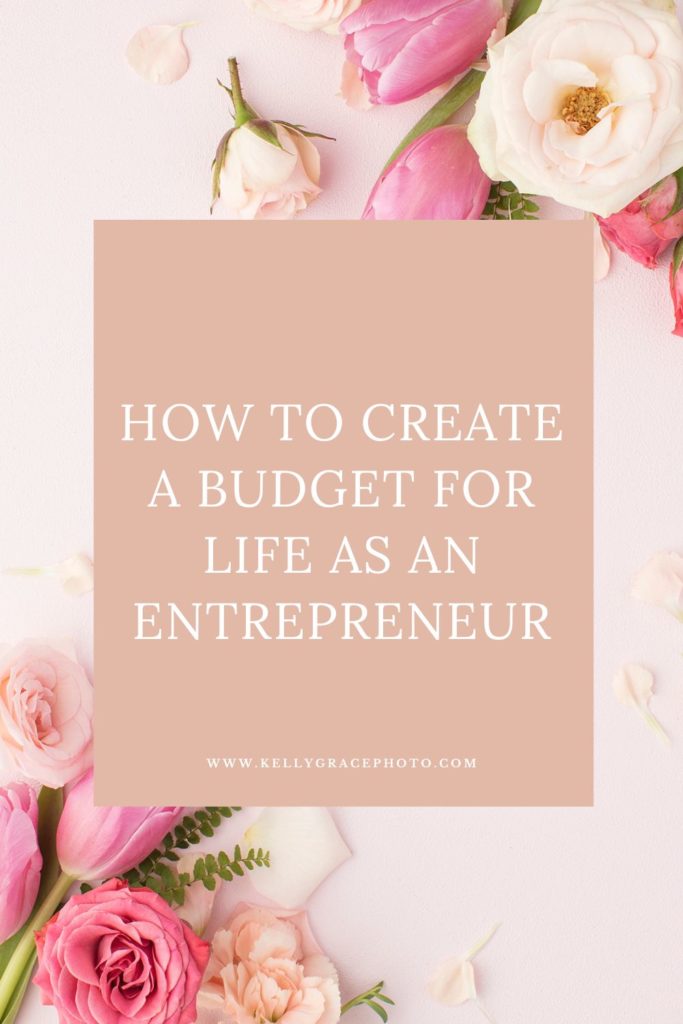Making a budget might seem overwhelming at first, especially if you’ve never created one before. Let me tell you loud and clear: You can do it! How? By breaking down the process into small steps.
Just like no one eats an elephant whole (you go one bite at a time), no one leaps into budgeting like a pro either (you have to take it one step at a time). So, how do you create a budget for life as an entrepreneur? Here’s how in six simple steps.
Budget Step 1: List Your Income
Budget Step 2: List Your Expenses
Budget Step 3: Subtract Expenses from Income
Budget Step 4: Track Your Transactions
Budget Step 5: Make Adjustments
Budget Step 6: Create a New Budget Before the Month Begins
Now that you have those steps down, let’s talk about my favorite budgeting method: the zero-based budget.
What Is Zero-Based Budgeting?
Zero-based budgeting is when your income minus your expenses equals zero. Perfect name, right?
So, if you make $3,000 a month, everything you save or spend should add up to $3,000. Every dollar that comes in has a purpose, a job, a goal. Nothing is left hiding or getting mindlessly spent on starbucks or that new Target purse.
This doesn’t mean you have zero dollars in your bank account. It just means your income minus all your expenses equals zero. It’s important to keep a little buffer in your bank account.. I recommend anywhere from $300 to $500.
How To Create A Budget For Life As An Entrepreneur

Before you start making your zero-based budget, log into your bank account or grab those bank statements out of your drawer. They come in handy when you’re wondering how much you normally make or spend on stuff! Be sure to have at least the previous three months of statements to look back on.
1. List your income.
You can do this the old-fashioned way with a sheet of paper, or you can use a free budgeting app such as EveryDollar or You Need A Budget.
What counts as income? Your regular paychecks and anything extra you plan to bring in during the month (think side hustles or child support). Write it all down and add it up! That’s your total monthly income, aka what you’ve got to work with this month.
If you have an irregular income —like many creatives do— I recommend to plan low. You should set up your budget based on your lowest monthly income estimate.
It’s way better to start low than to start with an average. Why? Because if you budget low, you can always go up from there. But guessing high and having to back off later—that spells trouble. (Not literally, of course.)
To find your starting point, look back at your Quickbooks or Honeybook. What’s the lowest you’ve made in the last few months? Go with that.
If this is your first time working on commission or living on an irregular income, don’t worry! For now, estimate what your lowest month will look like. And put that in as your income.
2. List your expenses.
You know what’s coming in—now plan for what’s going out. Think of everything you spend money on during the month and list them all out.
First, focus on covering what is called the four walls: food, utilities, shelter and transportation. Then, budget for all your other monthly expenses. Start with the essentials, like insurance, debt and childcare.
Finally, give yourself a miscellaneous line and budget for nonessentials, like TV streaming services, restaurants, adult kickball league fees, subscription boxes and personal spending.
But remember—if you have an irregular income, you may not be able to enjoy certain extras every month.
For example, if you have a month of lower income, that might mean you have to cut spending in places like your entertainment category. Maybe this month, you’re renting a movie and getting frozen pizzas to eat at home instead of going out for dinner and a movie. (Which actually sounds really nice anyway.)
Hey, you have to cover your needs before your wants. Period. But you’ve got this.
Let’s recap the heavy hitter here: You might have to skip some of the extras (or plan low) at first. But if your income ends up higher than what you’ve planned—well, Step 5 covers that! But don’t skip ahead. Read it all!
3. Subtract your expenses from your income
This number should equal zero, which is why we call it zero-based budgeting.
So, why zero? A zero-based budget is my absolute favorite budgeting method because it’s all about giving every dollar a job—whether that’s saving for retirement or that new camera, paying off debt (kick Salle Mae to the curb!) or spending. Every dollar that comes in has a purpose that you assign it! Dollars without jobs get spent accidentally on impulse buys and Starbucks runs.
Remember, spending isn’t bad. But spending without purpose will keep your financial goals miles out of reach. Forever.
Let’s talk some logistics here, though. What if you subtract your expenses from your income and you’ve got money left over? Um, give yourself a pat on the back and then put those dollars to work by putting any “extra” money toward your current money goal.
What if you end up with a negative number? This is actually pretty likely if you’ve got an irregular income. You’re budgeting low, remember? But it’s okay if your numbers are off. You just need to cut the extras (at least for now) until your income minus your expenses equals zero.
4. Track your expenses (all month long).
Want to know what one of the biggest secrets to budgeting well is? Track your expenses!
What does that mean? When you spend money on something, you subtract that amount from its budget line. That way you always know how much money you have left to spend and that keeps you from overspending.
When you make money, add that to your planned income for the month. This is incredibly important if you have an irregular income, because tracking your income will show you if you made as much as you planned or not.
And hopefully, you made more than you planned. Who doesn’t love it when that happens? I’ll talk in the next step about what to do when you have extra money to budget, but first I want to make sure I’ve covered all the bases about why you have to track expenses.
Budgeting is planning where your money will go. Tracking expenses shows you where the money did go. Tracking expenses holds you accountable—to yourself!
So track those expenses. Every single one.
5. Make adjustments on payday.
The key to winning with budgeting on an irregular income is being flexible and staying on top of it. One of the ways you do that is by adjusting your budget as you get paid.
If your income ends up being higher than you planned, add the extra income to your budget.
So, if you set your monthly income to $4,500 but actually made $5,000, go back and add that extra $500 in as income.
Then what?
You still want a zero-based budget (and you had one) until that extra $500 came in. (Nice problem to have, right?)
Time to put that money to work! You can add it to your current financial goal or you can go back to one of those extras you cut back on/skipped when you first made your budget.
6. Create a new budget before the month begins
While your budget shouldn’t change too much from month to month, the fact is, no two months are exactly the same. That’s why you create a new budget every single month—before the month begins.
When you’re ready to start your next budget, just copy over this month’s budget to the next, and then make changes for anything new that’s coming.
Here are some examples of month-specific expenses to prep for:
- Celebrations like birthdays and anniversaries: Never forget those.
- Holidays: Do you need decor, gifts or a feast at the ready?
- Seasonal purchases: Don’t forget to budget for back-to-school season, fall coffee flavor releases, and your summer softball league.
- Semiannual expenses: Do you pay your auto insurance twice a year? Do you need an oil change next month?
- Annual expenses: Is it time for your yearly eye exam? Do you need to budget for your pet because Teddy needs to get his shots at the vet?
You Can Budget (and Do It Well!) With an Irregular Income
Budgeting is how you make any money goals happen—it’s how you make progress with your finances! It puts you in control and gives you permission to spend your money your way.
I could go on and on and on because I honestly believe making a budget—and living that budgeting life—is one of the most important decisions you’ll make with your finances.
Remember, anything worth winning takes work. If you want to win with money—you’ll have to work at it. It usually takes around three months to get comfortable with budgeting, no matter your income. So, keep going! You can do it!






add a comment
+ COMMENTS